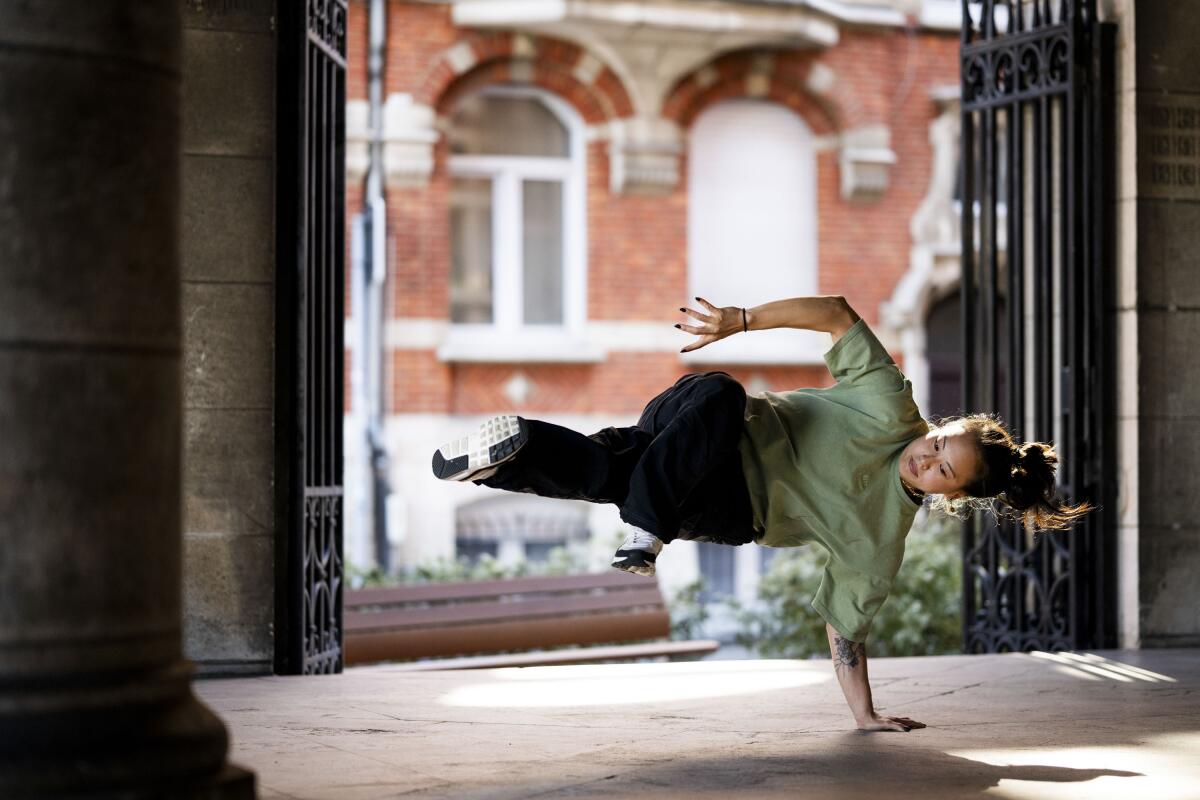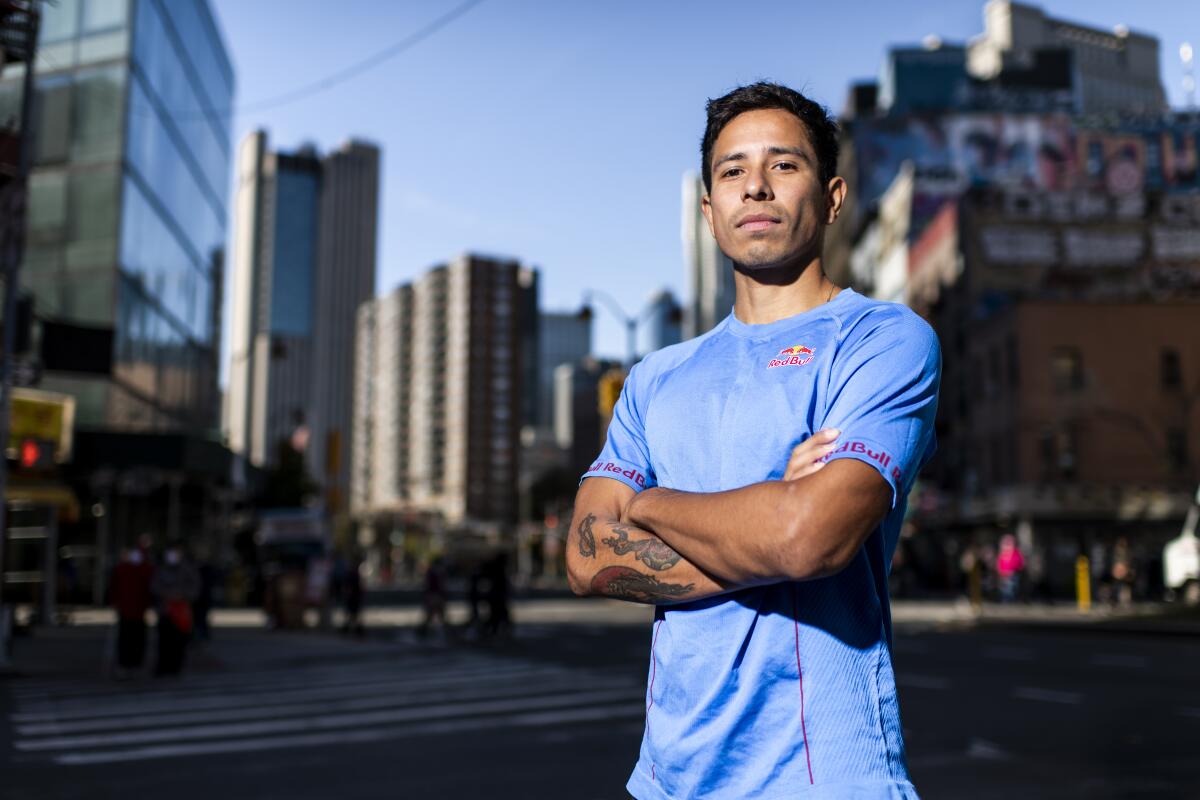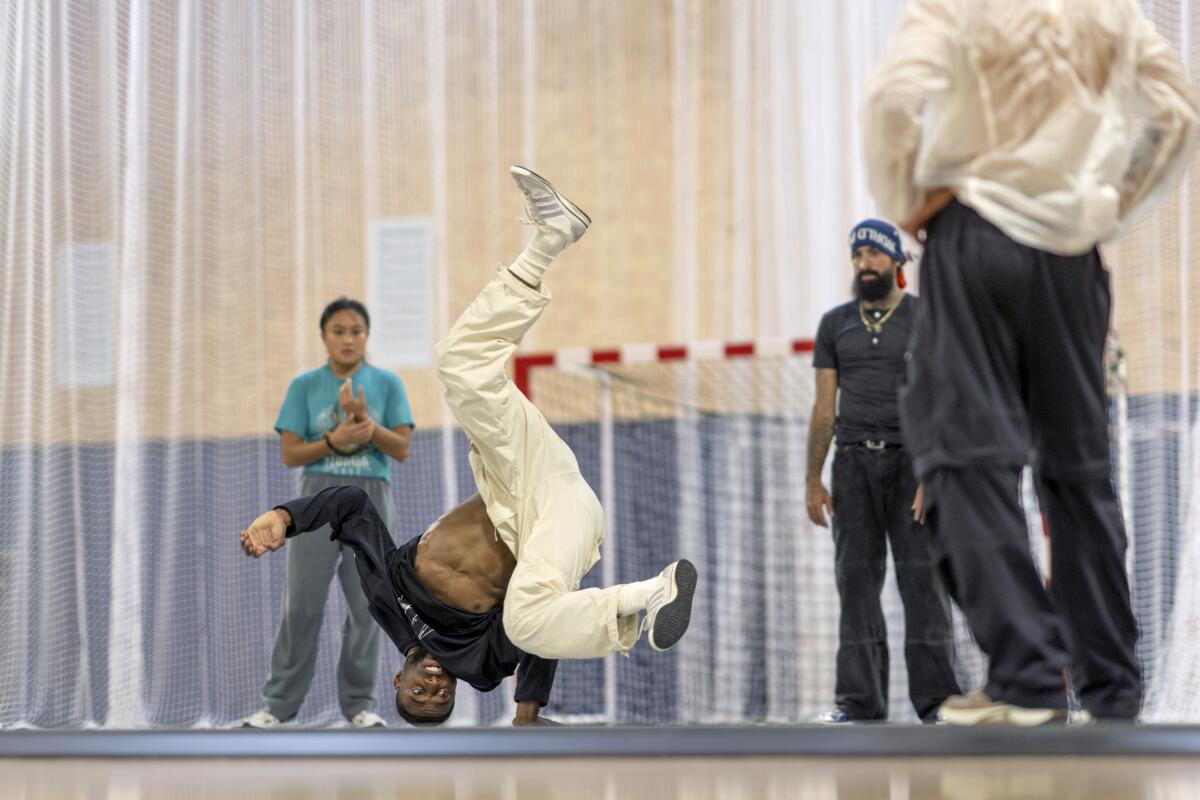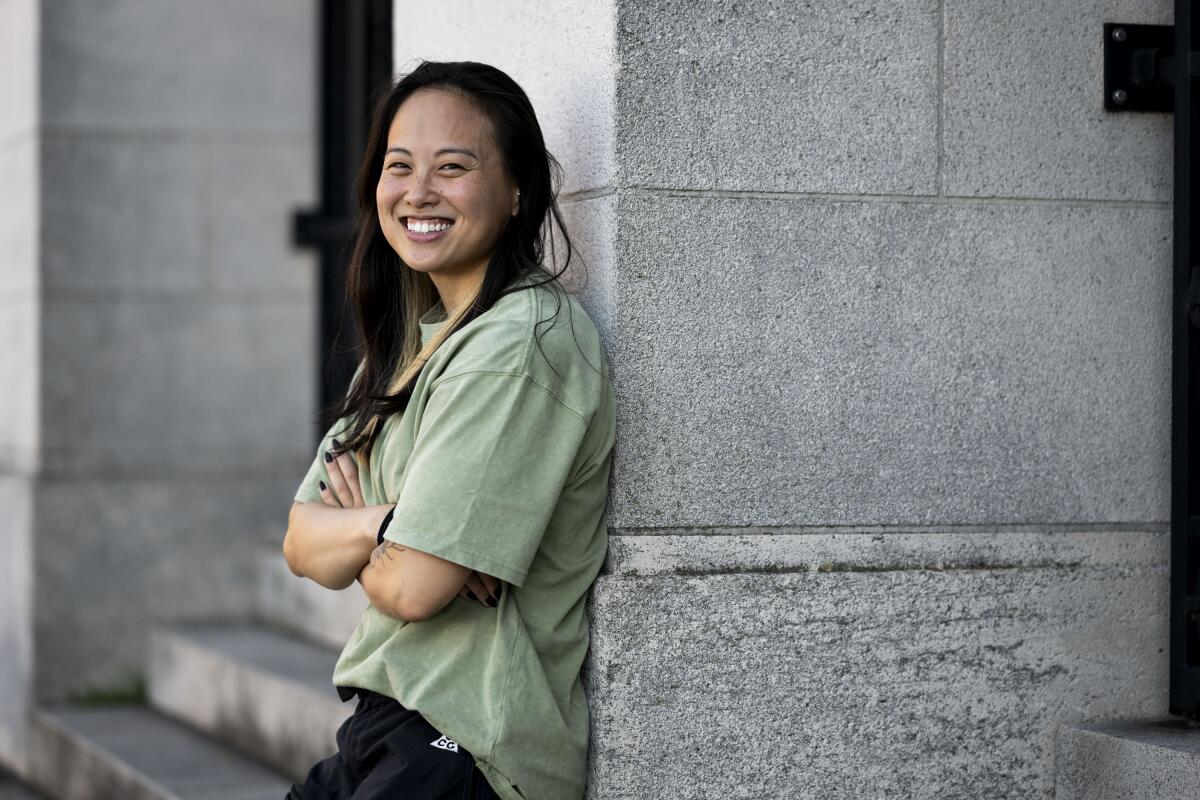Breakers are getting an Olympic stage, but will the sport eclipse the artform?

- Share via
Late last year, Victor Montalvo and Grace Choi rode around on a double-decker bus in Los Angeles, signing autographs and doing press as athletes who would be representing the United States in the Olympics’ first breakdancing, or breaking, competition in Paris.
Both have competed internationally, with Montalvo (a.k.a. b-boy Victor) earning his spot in Belgium and Choi (b-girl Sunny) joining Team USA with a win at the Pan Am Games in Brazil. The duo has been expanded to a quartet for Paris, adding Houston’s Jeffrey Louis (b-boy Jeffro) and San Diego native Logan Edra (b-girl Logistx). On Friday, the U.S.’ breaking hopefuls make their bow at Paris’ open-air Place de la Concorde venue, and though gold medals and exposure are the goals, “representing” is an even bigger part of what will transpire on stage.
Bringing that sense of connection to familial roots, ethnicities, crews, cities and, now, countries to the stage through dance is the “essence” of breaking. Representing is not solely an American trait, but for Montalvo, it’s one of the biggest differences between U.S. and international breakers.
“So what [U.S. breakers] have and represent is the essence of the dance. The traditional style, the foundation,” he says. “What the people overseas have done is they brought out the physicality part of it — so they took it to the next level. Things that you thought were impossible to do are now possible, and that’s what they’ve done. They’ve innovated a lot of the traditional moves from us, and they elevated those moves.”

With the way the French have embraced breaking, it seems only right that the event is being held steps away from the famed Avenue des Champs-Élysées. Much of the world has taken to breaking the way the U.S. did in the 1980s. Early American breaking movies such as “Wild Style” in 1983 and “Breakin’ ” and “Beat Street” in 1984 popularized the dance genre and introduced hip-hop to the world. Early naysayers to the sport’s inclusion in the Olympics came largely from the American dance community. Breaking coach and teacher Victor Alicea (a.k.a. Kid Glyde) has heard the popular “art vs. sport” argument. Will the sport take away from the art? Will its inclusion in a broader platform like the Olympics take away from the expressive, sometimes gritty aspects of battling? Those issues will now be part of post-Games evaluation, and as a pillar of hip-hop — one of the five elements, which include emceeing, deejaying, graffitti and knowledge — it’s understandable that the discussion takes place. But in other countries like those competing in the next couple of days, the debate has been over for a while.
Globally, “they respect it so much in the art world, to where the government will fund this culture. In America, the government is not funding anything, from what I see,” Alicea says. “But around the world, like in France, they fund it. Japan, Korea, all these different countries, from my understanding, they fund the culture to the point where now it’s in the Olympics.”

Those who have not followed the international breaking scene might be surprised to learn how popular it is globally. Most of the top-ranked breakers are from other countries, including Japan, France, Canada and Russia. Alicea, a longtime breaker who teaches kids through his Kids Breaking League and has participated in shows that spotlight kids breaking like “Alma’s Way,” has seen the sport rise.
“There were times on TV, they would call us untrained dancers,” says Alicea. “But to be the first dance in the Olympics is a proud moment. I mean, the first and only dance. I think it solidifies the dance because look how powerful it is. Everybody in the world is doing it.”
Back home, though, Los Angeles chose not to include breaking in 2028 — a big disappointment in the hip-hop world.
“I feel like we’re forgotten, but we were there since the beginning. We are hip-hop,” Montalvo says.

It’s a setback for the business side as well, says Choi, in terms of growing the sport.
“It’s not that we need the Olympics, but it is a level of exposure and attention that is hard to get elsewhere. And also I think it opens doors financially for so many people in our community that potentially won’t have that opportunity otherwise. That’s the piece that I’m really disappointed about is that opportunity that could have been within our community come L.A. ’28.”
Despite a cloudy future, the present looks bright, and Montalvo and Choi have clear personal missions for these Olympics: Win gold and serve multiple cultures. Montalvo has spoken about serving the Latino culture as a Mexican American athlete, following in the footsteps of his dad and uncle who were popular breakers themselves.

For Choi, she has had to navigate how best to represent Asian Americans in sports.
“I often get asked a question for interviews: What actor or actress would you have represent you in a movie portraying your life? My answer is always, like, there’s not enough Asian women for me to pick from. There’s nobody who I feel like actually resonates with me,” she said. “So that’s the kind of representation I think is important — for people to be able to see people who look like them doing amazing things.”
There’s already talk about the sport being brought back for the 2032 Olympic Games in Brisbane, Australia. So the advocacy continues, and these Paris Games could elevate interest in the sport and even hip-hop culture in general.
“I feel like after the Olympics, to be honest, there’s going to be a lot more kids wanting to learn how to break because it’s not easy to do,” says Montalvo. “But you don’t need much. You just need your body and a dance floor. That’s it.”
More to Read
The biggest entertainment stories
Get our big stories about Hollywood, film, television, music, arts, culture and more right in your inbox as soon as they publish.
You may occasionally receive promotional content from the Los Angeles Times.











